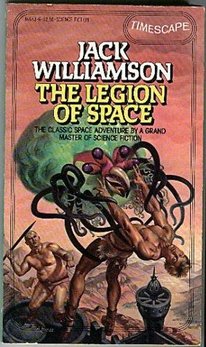
https://www.goodreads.com/review/show/988149834?book_show_action=false, I apparently forgot to cross-post it to my blog, which is a tad sloppy. Therefore, now that I am almost done with the final book in the trilogy, and hence on the verge of posting another review, here, belatedly, comes this ’un.
Rafeeq
Jack Williamson's The Legion of Space is an interesting artifact the Golden Age of science fiction, copyrighted in 1935 and then tweaked after the war with its twentieth-century narrative frame now mentioning Pearl Harbor. It is definitely an acquired taste, though. If this novel were the work of a modern author...well, the thing simply would not be publishable, as if Norman Spinrad's The Iron Dream, by Adolf Hitler had been stripped of irony and self-awareness; call that, at most, one star. From the perspective of the mid-1930s, though, presumably it would be a four- or perhaps five-star book...in the category of "science fiction space opera," of course. For a science fiction buff whose readings have included the old stuff, let us call it now two or three stars, rounding up on general principle.
The story is pure adventure, at a breakneck pace, with short little chapters ending with a cliffhanger. I do not fault it for that--such is the genre, and even quaint oddities such as future fortresses with medieval-style walls, alien jails whose completely mechanical locks can be picked by Earthlings, awe-inspiring buildings whose dimensions usually come in increments of thousands of feet, and whatnot do not detract too much. The voice of the narrative, however, is a little harder to swallow: a simple third-person point of view that is big on superlative descriptors of the external world while dipping into the inner mind of the protagonist somewhat perfunctorily. Again, though, that is the 1930s.
What grated a bit for me was the utter simpleness of worldview. Good is good, and bad is bad, and while there may indeed be truth in that, too often such things were just painfully obvious. The man who would overthrow democracy and reinstate a monarchy, with himself as Emperor of the Sun, for example, seems a baddie from the moment he steps onstage, wearing makeup bold enough to be read even by viewers in the last row. This distant relative of the protagonist is effeminate and haughty, possessed of "insolent pride" and a "[r]etreating chin and irresolute mouth betray[ing] the man's fatal weakness"--all of this given in five ex cathedra lines predating by three decades the "Show; don't tell" admonition of countless creative writing professors. When the protagonist ignores his shiver of unease and instead tells himself that he should not doubt this superior officer of the Legion of Space--who is attended, by the way, by one trooper described as ratlike and another described as wolfish--this gives us less complexity than an awkward and cringe-worthy moment. How, after all, did he miss the urgent piano music and the mustachios being twirled?
The giant jellywish-like alien invaders are evil, as apparently can be apprehended at first glance. The "girl" who guards the secret of the ultimate weapon that has kept the peace of the Solar System is slim and beautiful, and naturally the protagonist falls--without, of course, ever consciously putting a name on it until the end--in love with her at their first meeting. One of his companions-to-be is a calm and quiet-voiced leader, one is hugely muscled, and one is an obese gourmand goldbrick always bemoaning, comic-relief-wise, his pathetic fate, and calling for another meal, another nap, or another bottle of wine...oh, yes, but he happens to be a top-notch locksmith and spaceship engineman, too. Even the protagonist's other distant relative, the one who arranged for the square-jawed fellow to serve under the baddie, is precisely what he seems, right down to the redeeming qualities that were obvious even when he seemed a traitor to all that was good and right.
Such carping out of the way, however, The Legion of Space is at least a decent book, so long as the reader understands that it comes from an era almost 80 years removed, from the heyday of pulp fiction. It is fun--it really is--if approached in the right frame of mind.
6 July 2014
 RSS Feed
RSS Feed
